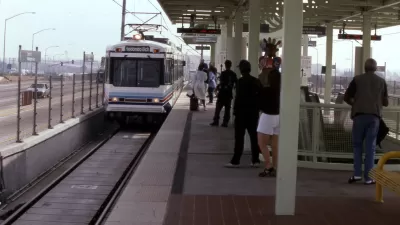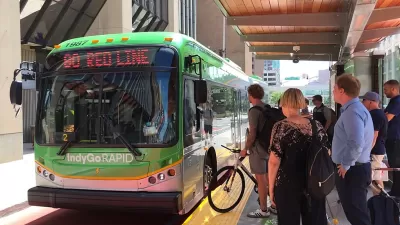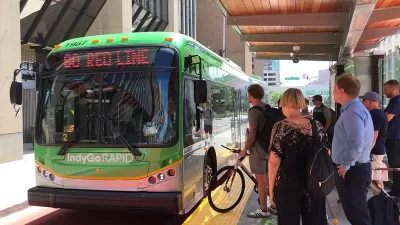Marion County may soon have the nation's most progressive tax dedicated to public transit, and only bus transit at that. In addition to the faith and business communities that backed the measure, Gov. (now V.P.-elect) Mike Pence deserves credit.

[Updated March 1, 2017] Of the 49 local and statewide public transit measures appearing on ballots throughout the United States on Nov. 8, a good deal of them being regressive sales taxes, one that stands out is Question 2 in Marion County, Indiana, which was overwhelmingly approved by voters thanks greatly to a large and diverse coalition of support. And Gov. Mike Pence, who was photographed by the media on Nov. 8 biking with his wife before voting, played no small part.
[Marion County is consolidated with Indianapolis through an arrangement known as Unigov, per Wikipedia.]
"Proponents of a public transit ballot referendum to increase bus service in Indianapolis declared victory Tuesday night, hailing the income tax hike approved by voters as a long-term solution for the city's transportation woes and a benefit to workers and employers, alike," writes John Tuohy, Indystar transportation reporter.
"With 99 percent of precincts in the county reporting, voters favored the measure 59 percent to 41 percent," reports Susan Orr for The Indianapolis Business Journal (IBJ).
The transit question, which was included on all Marion County ballots, asked voters whether they wanted to give the City-County Council the authority to impose an income tax of up to 0.25 percent—25 cents per $100 of income—to help fund the Marion County Transit Plan. For a resident earning $50,000 a year, that 0.25 percent equals an additional $125 in annual income taxes.
The plan calls for $390 million in improvements aimed at strengthening IndyGo’s bus service—extending hours of operation, increasing the number of bus routes that run at 15-minute frequencies, and running every route seven days a week. The transit tax also would fund the operational costs of three rapid-transit lines, which feature buses that run more often and make fewer stops
As Planetizen editor James Brasuell detailed in August 2016, the public transit referendum, Public Question 2 on the November Marion County ballot was backed by the "ministers, priests and pastors in the Indianapolis Congregation Action Network (IndyCAN), who view "public transit [as] a social justice issue for low-income residents," writes Tuohy. But they also had powerful allies in the effort.
"We've spent 10 years working on this. I think its time has come," Mark Fisher, Indy Chamber's vice president of government relations and policy development, told IBJ. "The chamber was one of a number of groups that threw their voice—and significant money—behind the transit referendum."
IndyCAN and the Indy Chamber, were part of a 13-member coalition of transit backers called Transit Drives Indy.
Gov. Mike Pence, Tea Party, Light Rail
In March 2014, Pence signed legislation "allowing six counties to decide whether to allow voters to approve or reject a new local income tax to fund public transit improvements." notes an earlier post which also suggests why the income tax was the chosen. In 2013, the bill overcame the opposition of the local Tea Party. One stipulation he added would frustrate rail transit proponents — ensuring that no light rail service be funded.
In his signing statement, he wrote that light rail would have "greatly increased the cost to taxpayers in the long term," WISH TV indicated.
However, the income tax increase is not a done deal. The legislation requires approval of the City-County Council, notes Orr.
The council could choose to approve the tax at the full 0.25 percent, or at a lower rate or decide not to pass any tax hike at all.
In May, the City-County Council approved the ordinance authorizing the referendum 18-6, according to IndyStar.
Thought not an income tax, the TriMet District and Lane Transit District in Oregon charge employers (but not employees) and those who are self-employed a payroll tax to fund transit operations.
Hat tip to Transportation for America
[An earlier version of this article incorrectly described the Indianapolis transit tax as the first of its kind. Cincinnati has a 0.3 percent earnings tax that funds transit.]
Related in Planetizen:
- Election Roundup: Planning's Big Day at the Ballot Box, November 9, 2016
- Communities of Faith Backing Indianapolis Transit Funding Referendum, August 18, 2016
- County Income Taxes for Transit? Hoosiers to Decide, March 28, 2014
- Tea Partiers Try to Halt Indy Transit Vote, March 21, 2013
FULL STORY: Marion County votes for higher taxes to pay for expanded transit

Maui's Vacation Rental Debate Turns Ugly
Verbal attacks, misinformation campaigns and fistfights plague a high-stakes debate to convert thousands of vacation rentals into long-term housing.

Planetizen Federal Action Tracker
A weekly monitor of how Trump’s orders and actions are impacting planners and planning in America.

In Urban Planning, AI Prompting Could be the New Design Thinking
Creativity has long been key to great urban design. What if we see AI as our new creative partner?

King County Supportive Housing Program Offers Hope for Unhoused Residents
The county is taking a ‘Housing First’ approach that prioritizes getting people into housing, then offering wraparound supportive services.

Researchers Use AI to Get Clearer Picture of US Housing
Analysts are using artificial intelligence to supercharge their research by allowing them to comb through data faster. Though these AI tools can be error prone, they save time and housing researchers are optimistic about the future.

Making Shared Micromobility More Inclusive
Cities and shared mobility system operators can do more to include people with disabilities in planning and operations, per a new report.
Urban Design for Planners 1: Software Tools
This six-course series explores essential urban design concepts using open source software and equips planners with the tools they need to participate fully in the urban design process.
Planning for Universal Design
Learn the tools for implementing Universal Design in planning regulations.
planning NEXT
Appalachian Highlands Housing Partners
Mpact (founded as Rail~Volution)
City of Camden Redevelopment Agency
City of Astoria
City of Portland
City of Laramie





























